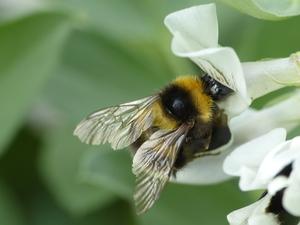Research team led by the University of Göttingen investigates influence of ‘greening measures’ on pollinators

Credit: Nicole Beyer
About one third of the payments received by farmers are linked to specific “greening measures” to promote biodiversity. The cultivation of nitrogen-fixing legumes is very popular. However, these measures have been criticized because the benefits for biodiversity are unclear. Now a team from the University of Göttingen, the Julius Kühn Institute and the Thuenen Institute in Braunschweig has investigated whether the cultivation of the faba bean (Vicia faba – also known as the broad bean or fava bean) can support wild bees. It turns out that bumblebees benefit from the cultivation of faba beans, while all other wild bees depend on the presence of semi-natural habitats. The results of the study have been published in the Journal of Applied Ecology.
The researchers recorded wild bees in various German agricultural landscapes for the study. In one half of the landscapes, conventionally farmed faba beans were cultivated; in the other half there were no bean fields. “The nectar of the faba bean is hidden deep in the flowers and is only easily accessible to larger bees with long tongues, such as bumblebees. We therefore wanted to investigate how groups of wild bees, which differ in their external appearance, react to the cultivation of faba beans and whether they can benefit from it,” says first author Nicole Beyer from the Functional Agrobiodiversity Group at the University of Göttingen. The study results show that there were more than twice as many bumblebees in the faba bean landscapes than in the landscapes without beans. In contrast, the cultivation of beans did not affect other wild bees. However, these other wild bees benefited from a high proportion of semi-natural habitats.
“Our research clearly showed that certain bee species can be supported by similar measures in farmed areas. But the benefits depend strongly on the characteristics of the crop and pollinator. In order to encourage the widest possible range of species, we propose a combination of measures: the cultivation of various flowering arable crops such as faba beans and the promotion or preservation of semi-natural habitats with a diverse range of flowers and nesting sites for many other wild bees,” concludes Professor Catrin Westphal, Head of Functional Agrobiodiversity at the University of Göttingen.
###
Original publication: Beyer, N., Gabriel, D., Kirsch, F., Schulz-Kesting, K., Dauber, J. & Westphal, C. (2020). Functional groups of wild bees respond differently to faba bean (Vicia faba L.) cultivation at landscape scale. Journal of Applied Ecology, doi: https:/
Contact:
Nicole Beyer
University of Göttingen
Faculty of Agricultural Sciences
Functional Agrobiodiversity Group
Grisebachstraße 6, 37077 Göttingen, Germany
Tel: (0551) 3933739
Email: [email protected]
http://www.
Professor Catrin Westphal
Functional Agrobiodiversity
Email: [email protected]
http://www.
Media Contact
Melissa Sollich
[email protected]
Original Source
https:/
Related Journal Article
http://dx.




